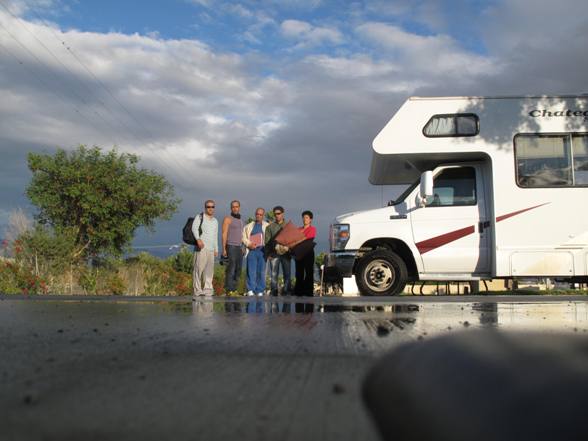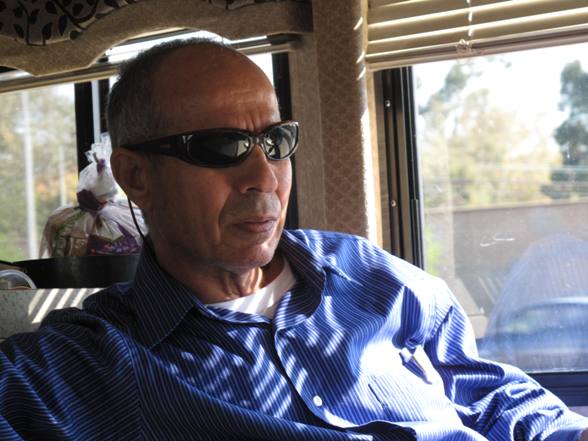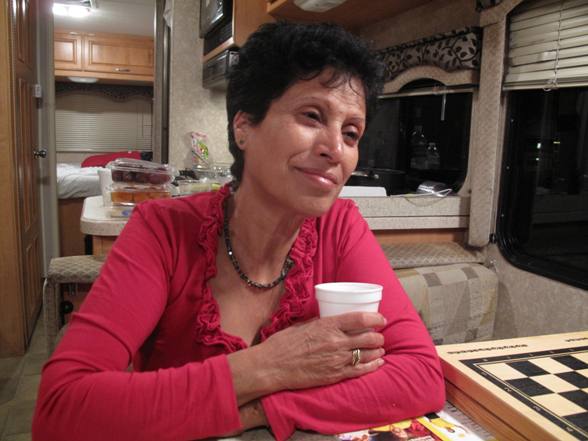Crowded. If you’ve ever been on a family road trip, you know how it feels to be inside that caravan: crowded, physically and emotionally. Family vacations are at once the high and low point of many a childhood memory. Spending several days with Mom, Dad and siblings – really with them 24/7 – is dramatically different from the daily routine that offers options for evasive action. School, work, friends and other diversions create a comfort zone of distance that help you make it through dinner and other excruciating family activities. As adults, creating that protective distance is even easier, it’s part of a natural process: you grow up, become independent, and move out. The distance you establish between you and your family is up to you. For some of us, as far away as possible is still not far enough. Suffice to say, when you join in on a family trip as an adult, there’s usually a lot of extra emotional baggage.

In Family Time, filmmaker Nitzan Gilady takes a close look at his own family as they take a trip to the Grand Canyon in an RV: Two parents, three grown up sons, and seven days of matza. Gilady constructs a documentary narrative that is as moving as it is entertaining. One becomes acquainted with the members of the family over the course of the journey as they talk and argue; sharing meals, laughter and tears. Family Time has a wonderful soundtrack. Yair Yona’s music composed for the film made me feel like I was along for the ride, the twang of the guitar carrying me through the open landscape of the West, to the bumpy, bouncy rhythms of family life.

The Giladys might be seen as emblematic of central themes in the Israeli narrative: the fierce desire of immigrant to see his children thrive and succeed; the Yemenite story in Israeli culture; issues of racism; Israeli parents with children who have chosen to live abroad; the impact of the army experience; and the gay issue. Yet it’s also the story of any and every family, with the universal conflicts between freedom and belonging, intimacy and intrusion, the need for connection and the desire for acceptance as an individual, what parents wish and dream for their children and the children, each with his own dreams and desires.

In addition to Family Time, which premiered at the 2012 Jerusalem Film Festival, filmmaker Nitzan Gilady has an impressive repertoire as director and producer, with several documentary films, including: It Runs in the Family (2010), Jerusalem is Proud to Present (2008), In Satmar Custody (2003), and The Last Enemy (1999), and the short fiction drama Queens Up (2008). I had the opportunity to converse with Gilady at a recent screening of the film in Tel Aviv. When I asked him what led him to make such a personally revealing film, his response was as honest and direct as the film itself.
“Turning forty was a personal and professional crisis for me, after several years in the profession and six films, I suddenly found myself in a place where I wasn’t working on a new project and didn’t feel drawn to any subject…eventually, it led to introspection, the camera aimed here,” he said, hand on heart, “this is me. Accept it.”

Acceptance and the meaning of acceptance is a central theme in the film, reflected in discussions of Nitzan Gilady’s sexual identity as a gay man, and the way each family member understands, experiences and responds differently to this knowledge. While not a new issue for the family, it is clearly one that had remained unresolved for many years. When I commented to Nitzan that I was surprised to sense his own unease with the issue as expressed in the film, he replied, “It’s my father’s voice, I carry it deep within me.”

Gay or straight, religious or secular, good boy/girl or bad boy/girl, Nitzan’s words are likely to strike a chord of recognition in anyone who has ever had parents. Their voices – approving or disapproving – become part of our internal soundtrack. Yet Nitzan said that his father’s honest and blunt disapproval is preferable to the alternative, the outward facade of acceptance in contemporary culture that remains no more than empty words, saying “We are still so far [from acceptance], Tel Aviv is such a bubble…there is still a long road to travel, many people don’t really say what they think.
“Some people may not like the film because there is a place for it [gay issues] in the movie,” he continued, “but I think we need to find a way to talk about these things. I need to find a way to talk to my father. I can’t just walk away from him, he’s my father. Just like we need to find a way for the left and right to talk to one another. Otherwise – what scenario will we have? The left will kill the right and the right will kill the left… and then what will we do?”
As they make their way to the Grand Canyon, each family member has a story to tell in this family road trip, and they all emerge as heroes – because they didn’t walk away, they chose to go on this journey together and talk to one another.
Family Time will next be screened at the Tel Aviv Cinematheque, 4 Ha’Arba’a Street Tel Aviv, 03-6060800:
October 1 & 6 at 13:00; October 8, 13 & 20 at 11:30; October 8, 15, 22 & 29 at 18:30.
Family Time trailer English from Nitzan Gilady on Vimeo.
trailer Family Time Hebrew from Nitzan Gilady on Vimeo.






Beautiful written and very well said, your words capture the essence of the movie and the essence of life. We are all sons and daughters that belongs to the mutual journey of our mothers and fathers. We have a choice. To love and walk together or be a part.
Comments are closed.